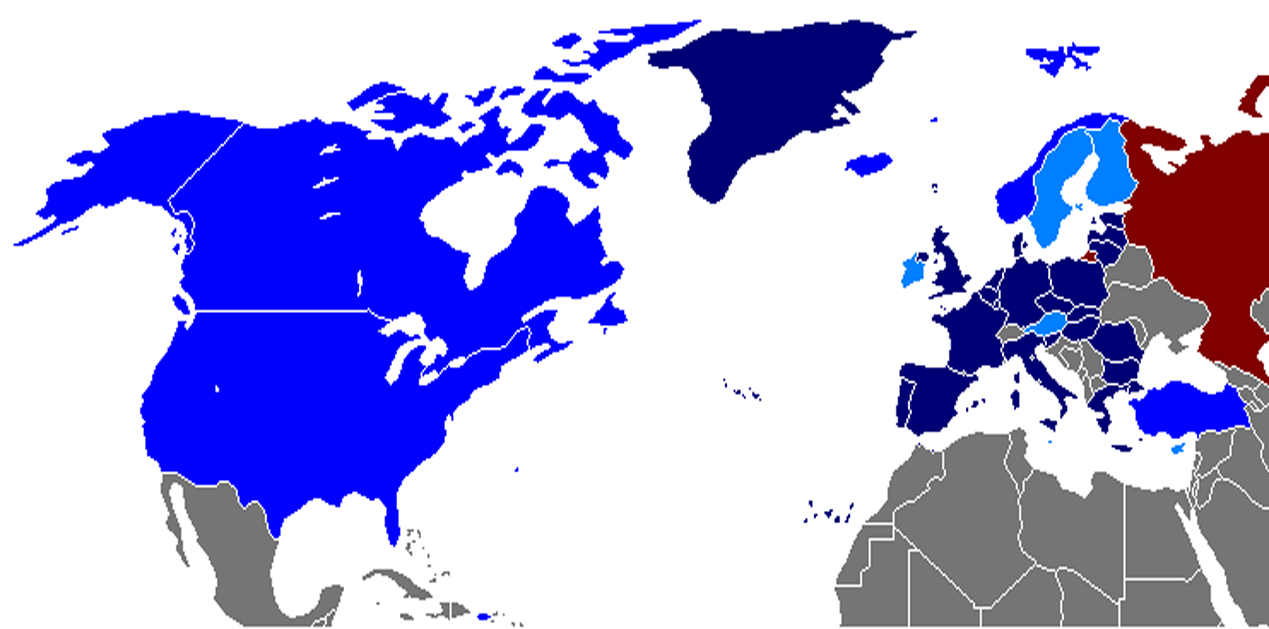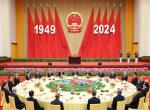“What we are currently experiencing is the brain death of NATO”, said the French President Emmanuel Macron in his interview to The Economist1. Explaining his remarks, he went on to say, “You have partners together in the same part of the world, and you have no coordination whatsoever of strategic decision-making between the United States and its NATO (North Atlantic Treaty Organisation) allies. None. You have an uncoordinated aggressive action by another NATO ally, Turkey, in an area where our interests are at stake. There has been no NATO planning, nor any coordination. There hasn’t even been any NATO deconfliction”.
Macron’s interview echoes his frustration over the European Countries being left out of the decision-making loop over political and strategic issues affecting the region and being treated as door mats especially by the US and some of its NATO allies like Turkey.
US’ role in Europe’s post War Reconstruction
Being a part of the Transatlantic system, Europe’s security since 1945 has been taken care of by the US through the NATO alliance and this arrangement continues till date. Alongside economic development, the arrangements were also aimed at preventing the spread of communism to the European soil which US perceived as its overriding strategic priority in containing the possible expansion of Soviet Union. Dependence on the US led NATO owing to its economy, military strength and technological capabilities provided exceptional deterrent capabilities to the countries of Europe without having to maintain a military force. This has enabled European countries to concentrate their efforts on economy, infrastructure and technology development.
As is the case in all such arrangements, European countries’ dependence on US for security is on Washington’s terms. The threat perception is based on Washington’s valuation which may not coincide with the thinking of the member countries. Decisions on deployment of forces, weapon systems and relationship with other countries are driven by US’ assessments and overall strategy. Countries may be branded as adversaries to suit Washington’s larger strategy and its global ambitions. European countries are obliged to buy all their requirements of weapon systems from US and not from other countries such as Russia.
All along Washington has been discouraging Europe from developing independent military capabilities as, with its leadership role of NATO, as long as NATO remains European Union’s (EU) sole security provider, US’ dominance in Transatlantic affairs is assured. This suits US which aspires to be the world’s permanent hegemon. US operates a number of military bases in Europe providing the country the strategic advantage to project power at almost no cost. With EU aligned to US, China and Russia are distanced from countries that are amongst the most developed in the world, leaving only China and Russia as US’ potential rivals.
The Changed Circumstances
The view that American and European interests are compatible to the point of being nearly congruent is no longer valid. In fact, US and Europe have been drifting apart for some time. The confrontation between NATO and Warsaw Pact, a collective defence treaty signed in Warsaw, between the Soviet Union and seven other Eastern Bloc socialist republics of Central and Eastern Europe in May 1955, during the Cold War resulted in confrontation and massing of troops and weapon systems on either side, across the borders of countries belonging to these blocks. The threat Europe and US were thus facing have dwindled to a large extent after the fall of Soviet Union in 1991. Today the troop levels and the deployment of nuclear weapons have reduced considerably and the Warsaw Pact is history. Post-Soviet Union’s collapse, the expansion of NATO to its East and to the region which Russia considers as its backyard provokes Russia causing tension as in the case of Russia’s intervention in Georgia and Ukraine.
The second change pertains to US withdrawal from the Intermediate-Range Nuclear Forces Treaty (INF Treaty), a landmark 1987 arms control treaty that eliminates an entire class of ground-launched cruise and ballistic missiles whether their payload is conventional or nuclear. Moscow and Washington are prohibited from deploying these missiles anywhere in the world, not just in Europe. The treaty banned ground-based missiles with a range of 500 to 5,500 kilometers (about 300 to 3,400 miles). Brokered by US President Ronald Reagan and Soviet leader Mikhail Gorbachev, the treaty led to the destruction of 2,692 short and intermediate-range missiles belonging to the US and Soviet Union, which otherwise would have been pointed at each other. The treaty bans only ground-based systems. Both sides are free to deploy air- and sea-launched missiles within the 500 to 5,500 kilometers range.
Accusing Russia of violating the treaty by developing and deploying a land-based cruise missile, the Novator 9M729, that is believed to have a range of 1250 miles US President Trump warned in February 2018 that US would quit the treaty if Russia continues to violate the treaty. Russia denies the allegations. No tangible evidence has however been provided by either side. US finally announced its withdrawal from the treaty on August 02, 2019.
US blames Russia for its withdrawal from the INF Treaty besides constantly projecting Russia as the revisionist power, possibly to develop a sense of vulnerability amongst European nations so as to perpetuate their dependence on NATO and in turn leave no option to Europe other than to remain under US control. The real issue is that China is not bound by the INF Treaty and it has deployed intermediate-range missiles in significant numbers in Asia. INF Treaty does not take into account the present confrontational relations between US and China and their Military balance especially in the Asia-Pacific region which today is becoming central to Washington’s strategic calculations. INF Treaty has become redundant and counterproductive to US’ interest besides increasing its military expenditure. Today US would prefer deploying ground-based systems in Asia rather than the expensive sea and air-based platforms.
Russia an Irrational Enemy of Europe?
Russia is a $ 1.63 trillion economy with $4.21 trillion GDP based on PPP2. World Bank estimates its GDP growth for 2019 at a paltry 1.2 percent3. With sanctions by the US and western country, it is laboring to manage its economy. With an economy that is smaller than Italy4 or Texas5, it is dependent on oil revenue to survive. It has very few reliable partners. Its military is in need of far reaching reforms and needs to build capacity beyond its nuclear arsenal to defend its interests and to deter those who might consider infringing on them. On the contrary the combined GDP of European countries is ten times that of Russia. Its currency is second only to the dollar. Britain and France are nuclear weapon armed countries which provides Europe the required deterrent capabilities. Under these circumstances does anyone expect Russia to go to war excepting when forced to? To believe Russia is an irrational enemy is unrealistic.
Change in US Attitude towards Europe
US President Donald Trump has been constantly denigrating the Europeans for free-riding and taking the American security guarantee for granted. He views US’ relationship with countries as bilateral, short-term, transactional and zero-sum. His predecessor, former President Barack Obama, had also been demanding the Europeans, to contribute more to their security. Trump has openly called NATO “obsolete” and questioned why American soldiers should die for a NATO ally like Montenegro. The raise of China as a major power and the relative decline of Washington’s economic and military might has sparked off the possibility of the emergence of a bi-polar world threatening US’ sole super power status and its dominance in world affairs. Consequently, US has shifted its strategic focus from transatlantic to the Indo-Pacific region which makes US perceive Europe more as a burden than as an ally.
US’ Dependability
Trump pulled out of Paris Climate Change agreement. Decisions and events in Middle East affect Europe much more than US. US has not been sensitive to Europe’s concerns and has failed to take Europe into confidence while taking decisions affecting Europe.
In 2011, US intervened in Libya but failed to stabilise the country after war. EU and US under Barak Obama brokered the 2015 Libyan Political Agreement which brought about the UN backed Government of National Accord (GNA) led by Fayez al Serraj. The effort was to integrate the military commander Khalifa Haftar into Libya’s new government, without turning all power over to him. But Trump came in and endorsed Haftar, raising fears of continued violence and instability in Libya besides the possibility of a refugee crisis threatening Europe.
Trump’s decision to withdraw troops from Syria risks resurgence of terrorism in the region besides opening the path for Turkey’s offensive against the Syrian Kurds in the North. French President Macaron hit out at Trump saying he “deeply regretted” US decision to abruptly change a pillar of US foreign policy in the region by bringing home the 2,000 troops. He added, “an ally should be dependable” 6.
Trump unilaterally withdrew from the Iran Nuclear Deal (JCPOA), an agreement brokered and signed by the P5 + 1 (US, China, France, Russia, UK and Germany) and endorsed by the UN Security Council Resolution 2231. Despite regular inspections by International Atomic Energy Agency (IAEA) and positive reports on compliance of the deal by Iran, US has imposed hard-hitting economic sanctions on Iran prompting Iran to go ahead with its nuclear programme as provided for in the accord. Europeans tried hard to render ‘INSTEX’, a European special purpose vehicle established in 2019 to facilitate non-USD and ‘SWIFT’ transactions operational. The strategy did not work as European businesses were concerned about being denied access to the US market and financial system by ‘secondary sanctions’ if they do business with Iran.
EU has major differences over US’ policy towards Israel and in the Middle East which undermines the two-state solution. In December 2016, the US abstained from voting on UN Resolution 2334 that condemned Israeli settlements as illegal. In December 2017 Trump declared that the US Embassy would be shifted from Tel Aviv to Jerusalem and the Embassy opened as stated in May 2018 triggering protests in a number of Arab countries. In March 2019, Trump ignored UN Security Council Resolutions 242 of 1967 and 497 of 1981 and recognised Israel’s sovereignty over Golan Heights, an occupied territory since the ‘Six Day War’ 1967 legitimising annexation, violating International Laws.
Peoples’ View
In early 2019 the European Council on Foreign Relations commissioned ‘YouGov’, a British international Internet-based market research and data analytics firm headquartered in the UK with operations in Europe, North America, Middle East and Asia-Pacific to carry out surveys covering more than 60,000 people across 14 EU countries. The survey included finding out their views on the foreign policy challenges facing the EU. Some of the relevant findings amongst others include7:-
- European voters believe that there is a growing case for a more coherent and effective EU foreign policy in a dangerous, competitive world.
- They want to see the EU come of age as a geopolitical actor and chart its own course.
- Most EU citizens believe that they are living in an EU in which they can no longer rely on the US security guarantee, and that the enlargement process should be halted.
- They believe that it is crucial to address existential challenges – such as climate change and migration – at the European level.
Can US led NATO be Reliable?
Europe is addicted to NATO’s security umbrella and some in Europe are under the illusion that the present arrangements for their security can continue forever without realising that the effects of the geopolitical, political and economic changes that are taking place in the world might find US pressured by events elsewhere to find it difficult to fulfil its commitments under Article 5 of the North Atlantic Treaty. US’ inaction in the Scarborough Shoal in the South China Sea, when China gradually encroached, reclaimed land and undertook construction activities to create military strong holds in the Spratly and Paracel Islands, despite the Mutual Defence Treaty of 1949 (MDT) between Philippines and the US, is the case in point. But the larger question is should EU accept US’ hegemonic position in perpetuity?
EU needs to consider the future of its security in case Trump decides to unilaterally pull US out of NATO as he has been doing in the case of many international agreements. More than that, time has come for Europe to take its place on the world stage as a major security player besides being counted upon as an economic and a technological power center. The happenings, turbulence and influx of refugees from the Middle East is a security and an economic issue for Europe and affects Europe much more than the US. Europe needs to handle its relationship with the Middle East themselves rather than leaving it to the US.
The Way Forward
If Europe wishes to define itself for a world that is much different from the times when NATO was created essentially to deter attacks by the erstwhile Soviet Union and be counted upon as an independent security and economic player, a transatlantic divorce may be inevitable. In that eventuality EU needs to arrive at a few important political decisions collectively on the following issues:-
- How would EU define itself?
- There is a need to initiate dialogue with Russia so as to end the present confrontational stance between EU and Russia. What are the gives and takes?
- What if countries which Russia considers as its backyard wishes to become part of the EU?
- Is it intended to create a common European Foreign and Security policy or would countries of EU have independent foreign policies?
- Who will be responsible for EU’s security? Will there be a European Military?
- What if due to differing perceptions on the foreign policies of independent countries, there are differences in the employment of EU’s military?
- Will EU’s military be employed against terrorism within EU?
- What would be the financial arrangements?
- What would be the EU’s policy on the employment of its Armed Forces beyond the boundaries of Europe including on UN missions, missions coming under right to intervention and for power projection?
Conclusion
The present strains in the relationship between US and EU are not temporary but are a result of the emerging bipolar world following the upsurge of Chinese power threatening US’ superpower status. Consequently, a lasting change in the global security architecture is clearly discernable. Under these circumstances, EU an alliance of 28 economically and technologically developed countries cannot continue to remain Washington’s satellite, be subordinate to unilateral American Grand Strategy or outsource their strategic thinking to Washington.
The need therefore is for European countries to come together to collectively decide their future destiny. The process will take time. The last thing that the US will want is a Europe with independent military capabilities. Can Europe manage hinderances to its move?
End Notes :
- ‘The French president's interview with The Economist’ conducted at the Elysée Palace in Paris on October 21, 2019 and English translation published on October 07, 2019, The economist, available at https://www.economist.com/europe/2019/11/07/emmanuel-macron-in-his-own-words-english, accessed on December 2, 2019.
- ‘IMF's World Economic Outlook Database, April 2019’, Update July 2019, International Monetary Fund, available at https://www.imf.org/external/pubs/ft/weo/2019/01/weodata/index.aspx accessed on December 10, 2019.
- ‘42nd issue of the Russia Economic Report’, December 04, 2019, World Bank, available at https://www.worldbank.org/en/country/russia/publication/rer accessed on December 10, 2019.
- ‘How is Russia so dangerous with an economy smaller than Canada’s?’, John Ruehi, Medium.com, April 18, 2018 available at https://medium.com/@johnruehl/how-is-russia-so-dangerous-with-an-economy-smaller-than-italys-6de5eabad75d accessed on December 10, 2019.
- ‘Which Has The Bigger Economy: Texas Or Russia?’ Frank Holmes, Forbes, April 17, 2018, available at https://www.forbes.com/sites/greatspeculations/2018/04/17/which-has-the-bigger-economy-texas-or-russia/#3b07661b70b9 accessed on December 10, 2019.
- Chris Stevenson, ‘Trump rebuked by Macron over Syria troop withdrawal: ‘An ally should be dependable’ INDEPENDENT, December 23, 2018, available at https://www.independent.co.uk/news/world/europe/trump-macron-syria-brett-mcgurk-regret-withdrawal-troops-latest-mattis-turkey-a8697166.html accessed on December 13, 2019.
- Susi Dennison, ‘Give the People what they want: Popular demand for a Strong European Policy’, European Council on Foreign Relations, Policy Brief, September 2019 available at https://www.ecfr.eu/page/-/popular_demand_for_strong_european_foreign_policy_what_people_want.pdf accessed on December 3, 2019.
(The paper is the author’s individual scholastic articulation. The author certifies that the article/paper is original in content, unpublished and it has not been submitted for publication/web upload elsewhere, and that the facts and figures quoted are duly referenced, as needed, and are believed to be correct). (The paper does not necessarily represent the organisational stance... More >>
Image Source: https://upload.wikimedia.org/wikipedia/en/6/6f/EU_NATO_Russia.PNG


.jpg)








Post new comment